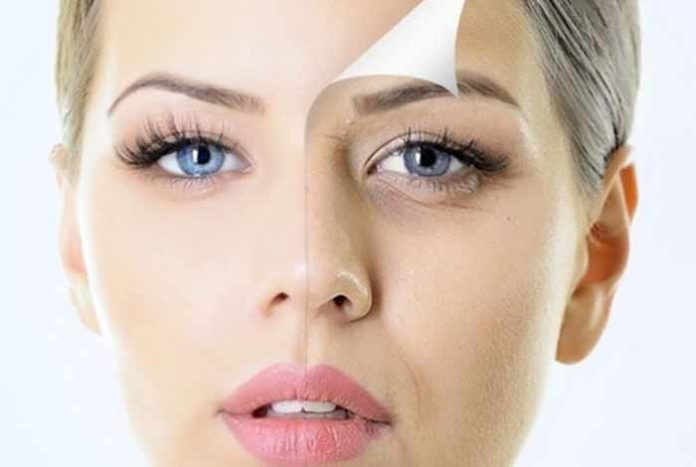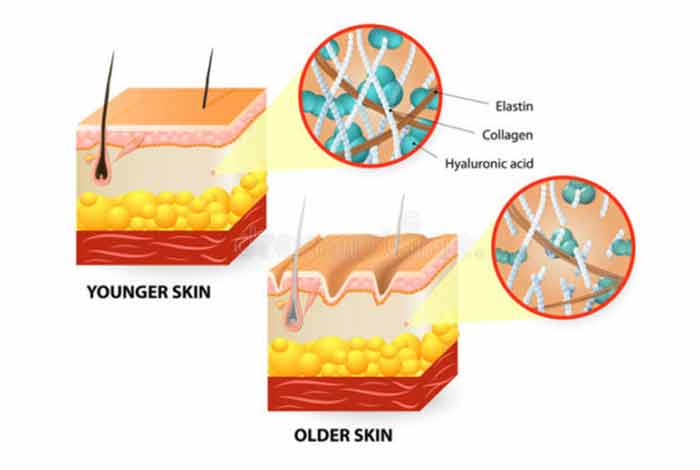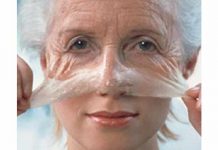
Youth is the gift of nature, but only a transient one. Old age smacks everyone someday. A paradoxical fact is that everyone wants to lead a long life, but the idea of aging doesn’t appeal to many. While you may still have a young soul and spirit, you wouldn’t want your skin and body to lag behind.
Modern era inspires you to look best all the time, but it has also brought in a lot of stress and other environmental factors like excessive sun exposure, alcoholism and smoking, which may be hastening your aging. Fine lines, wrinkles, dementia, weak bones and joints are some of the common signs of aging. However, in some people, aging can be even more horrendous, marking the onset of arthritis, stroke, coronary artery disease, diabetes, hypertension, schizophrenia, macular degeneration, osteoporosis and several other ailments. Basically, when you age, your skin, bones, muscles, joints, eyes, nerves, blood vessels and even your vital organs are affected. That simply means that something has to be common in all these components, which is responsible for these deleterious manifestations of aging.
Well, this common component is “collagen”. It is the most commonly found protein, present throughout the human body. Consider it as a glue, that binds the body together. Basically, it provides strength and structural stability to your body. Hence, it is often referred to as a “body scaffolding”.
Now, you may wonder, how is collagen relevant in the context of aging? Before discussing that, let me ask you another question? Why are the babies born with supple smooth skin? And why doesn’t it stay impeccable throughout your life? Well, it is so because you were born with an abundant reserve of collagen. This collagen constitutes 80% of your skin, imparting it a youthful elasticity and plumpness. Also, the bones, joints and muscles of your body are enriched with a lot of collagen when you are young, keeping you more active and fit. Collagen present in your blood vessels, nerves and vital organs keep you away from many diseases, while you are young. Another miraculous fact about collagen is its ability to repair the damaged tissues of your body, when the need arises.
Now, is the supply of collagen limited? Well, up to your mid and late 20s, your body continues the production of collagen to sustain its strength, flexibility, and stability. But, what happens after your late 20s? All this splendid youthfulness vanishes with the degenerating collagen. Basically, once you enter in your 30s, your collagen production declines dramatically. Thus, your skin loses elasticity, your skeletal structure becomes weak, your memory is impaired, your blood vessel wall becomes fragile, your healing is slowed down, and your vital organs give up easily, giving rise to some dreadful diseases.
Collagen as an Antiaging Supplement

The role of depleting collagen in aging justifies the widespread marketing of collagen supplements in the form of injections, capsules, pills and even powders. These supplements are derived from several animal sources. Melinda Mora, an eminent sales professional of cosmetics in New York City, is an extremely skin- conscious individual. She regularly uses efficient skin serums, sunscreen and has also been reaping the skin-rejuvenating benefits of laser treatment. You may think that what is so exceptional in her skin-care regime? After all, we all advocate these in our daily lives. Well, she has incorporated one more element in her regime since the last 6 months. She consumes one scoop of cow, fish, and chicken collagen in her morning smoothie. Now, doesn’t this make her skin-care routine outshine in the lot?
Insisting on the outstanding efficiency of the collagen supplement, she states that her skin has regained its luster, her nails have become stronger and she is more active now owing to her pain-free joints.
Now that you are startled by the ethereal properties of collagen, you may be thanking our ardent researchers. Well, a more interesting fact is that collagen has been known for its antiaging effects since long. History has numerous pieces of evidence suggesting its consumption in a minimally processed form. For centuries, Chinese women have been feeding themselves with donkey’s skin to get plump skin and healthy joints. 1980s marked the emergence of injectable fillers of collagen, which can be infused in the lips to increase their fullness and in the fine lines to restore their elasticity. In the beginning of 2018, the beneficial effects of collagen have reached many ears. Hence, according to Nutrition Business Journal, U.S consumers are expected to spend almost 122 million dollars in collagen products in 2018, which is almost 30% of last year’s expenditure.
Controversial Front

There is no one who can deny the fact that collagen replenishment is the key to reverse aging. But, collagen supplements have a plethora of controversies associated with them.
Mark Moyad[1], Managing Director of the Complementary and Alternative Medicine program at the University of Michigan Medical Center, says that collagen supplements lie in the top three products people inquire about, but its benefit in aging is a matter of controversy.
Whitney Bowe, a New York Dermatologist and author of The Beauty of Dirty Skin: The Surprising Science of Looking and Feeling Radiant from the Inside Out, says that injectable collagen fillers have been outdated now as they are not long lasting and can inflict allergic reaction. Also, applying these supplements on skin may not absorb well and thus, their advantages are questionable. But, she considers edible collagen supplements in the form of powders to be a revolutionary product.
Controversies are the driving force of science. Hence, several studies have been done to reach a definitive conclusion. A study done in 2014 included 69 women, aged 35 to 55, who consumed 2.5 to 5 grams of collagen daily for a duration of 8 weeks. At the end of the study, these women demonstrated better skin elasticity.
Another study involved women consuming 1 gram of chicken collagen per day. These women developed a more vascular skin with a 76% reduction in skin dryness, 12% reduction in visibility in wrinkles and a 6% increase in collagen content.
But, highlighting the limitations of these studies, Moyad says that these studies are in their budding stage and were done on a very small scale, thus their findings cannot be completely relied on.
Lauren Eckert Ploch, a Georgia-based dermatologist, believes that instead of chasing the antiaging role of collagen, its high protein content should be emphasized on. She doubts the efficacy of these supplements in aging as the acid of stomach break down the protein of these supplements, thus by the time they reach skin, they are rendered minimally effective. But, she feels that collagen supplements are far better protein source than antiaging potion.
Moyad validates her sayings through findings of some studies, which showed better joint health, body composition and healing potential, owing to the high protein content of these supplements.
One recent study involved 53 old men, with a condition known as sarcopenia, which is marked by muscle loss due to aging. These men lifted weight thrice a week and took collagen supplements daily for 3 months. Results showed an increased muscle gain in this group as compared to those who only lifted weights.
Now, the biggest question is How safe are these supplements? Moyad raises the most common concern with these supplements, i.e., heavy metal poisoning. These supplements are made from parts of fish, cows, pigs, and chicken, which act as sponges for metal contaminants.
But, in response to this common concern, reputed companies claim that at the time of manufacturing, their products are run through a crude procedure or heavy metal testing and the products are sold only when they clear all the trials.
Another issue raised by dermatologists is the risk of acquiring neurological disorders on consuming collagen derived from cow, suffering from mad cow disease or Bovine Spongiform Encephalopathy (BSE). Looking at the harm posed by cow’s meat, FDA in 2016 banned the use of cow in any supplement.
Giving a better outlook on the whole issue, a naturopathic doctor, Dr. Duffy MacKay says that the use of collagen in counteracting aging is based on a well-researched science. He also says that to combat the health issues raised by other scholars, the concerned companies should label their products as “BSE-free” and the governmental and industrial body should set a standard protocol to make sure that these supplements do not contain toxic levels of heavy metals.
An altogether different opinion was given by Valori Treloar, a dermatologist from Massachusetts, who says that dietary supplements are marketed without an effective regulation by concerned body, hence she recommends her patients to take it through dietary sources. She says that a stock prepared at home from bones of chicken, beef and fish are rich and safe sources of protein.
However, the idea of collagen supplement is tempting, hence, drawing attention of many. Here are some points to keep in mind while choosing an effective and best collagen supplement:
• Opt for companies preparing their supplements from bones derived from antibiotic-free and cage-free sources.
• Go for a widely trusted brand, consisting of a third-party label, such as USP or NSF.
• Do not choose collagen supplements with added ingredients, like fiber or probiotics, as these may alter the efficacy of collagen and hence, may prove less effective.
Looking at the different opinions of so many researchers and doctors, it is hard to draw conclusion regarding the effectiveness and safety of collagen supplements in antiaging. However, the safest approach to deal with the hardships of aging is to eat healthy. Eat a protein-rich diet with a moderate amount of other nutrients. Regular exercise and a nutritious diet stand supreme to any supplement and any treatment procedure.










